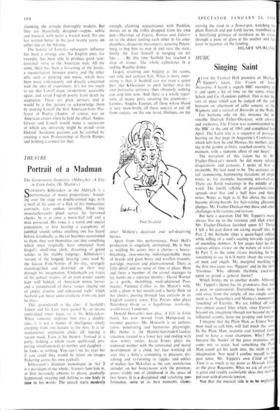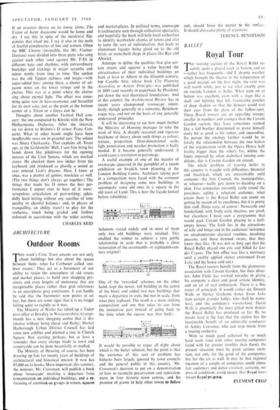MUSIC
Singing Saint
AFIER the Festival Hall premiere of Michael Tippett's latest, The Vision of Saint Augustine, I heard a superb BBC recording of
it and spent a lot of time on the score, which Schott and Co. (London) publish. This is not the sort of piece which can be judged off the cuff between an afternoon of cello sonatas at the Wigmore and a revival of Butterfly at the Wells. For baritone solo (in this instance the in- vincible Dietrich Fisher-Dieskau), with chorus and orchestra, The Vision was commissioned by the BBC at the end of 1963 and completed last April. The Latin text is a sequence of passages bearing on that page in Augustine's Confessions which tells how he and Monica. his mother, talk- ing in the garden at Ostia, touched eternity 'for a moment, with a supreme effort of our heart.'
The narration of this vision lay in Mr. Fischer-Dieskau's mouth. So did many related disquisitions and ecstasies. I spoke of him as invincible. He had need to be. The ecstasies en- tail stammering, hammering iterations of single notes, te, for example, becoming teh-eh-eh-eh.
There are florid rocketings in the middle of a word. The fourth syllable of perambulavinuts spreads over five and a half bars and thirty notes. Notes as high as G flat above the stave become diving-boards for hair-raising glissando plunges. Mr. Fischer-Dieskau met these and other challenges with stamina and fervour.
But here a question. Did Mr. Tippett's music always live up to the resource and élan which Mr. Fischer-Dieskau lavished upon it? Thrice I felt a bit cast down on asking myself this. In Part 2 the baritone sings a quasi-fugal subject while telling of a soul's soaring towards regions of unending richness. A few pages later he dis• courses allegro vivace on the nature of wisdom.
In Part 3, to the same vivace marking, he has something to say in 6/8 metre about the tongue; of men and angels. My marginal marking in the first two cases was 'flippant' and in the third `frivolous.' Why obtrude rhythmic cockiness upon so grand a general theme?
Which brings me to another doubt. Although Mr. Tippett's theme has its grandeurs, they lack a peak or centrepoint. Everything leads up to and away from the simple, all too simple state• ment as to Augustine's and Monica's momentar `touching' of Eternity. We are fobbed off with two almost casual lines which, since Eternity beyond my imagining (though not beyond my in- tellectual assent), leave me groping and hungry. I imagine that the Plain Man, as Ernest New man used to call him, will feel much the same.
In the Plain Man, oratorio and kindred forms used to have a stout champion. Why? Partly because the 'books' of the great oratorios, and some not so great, had something the Plai Man could get his teeth into, the teeth of th imagination. Nor need I confine myself to th past tense. Mr. Tippett's own Child of Or Time is as much to my point as Messiah. Vila or the great Requiems. What we ask of orators is great and readily assimilable ideas that shall put over with dramatic tension. Not that the musical side is to be neglected
If an oratorio throve on its music alone, The Vision of Saint Augustine would be home and dry I say this in spite of the incidental flip- pancies that irked me. I say it also in the teeth of fearful complexities of line and texture. Often the BBC Chorus (invincible, like Mr. Fischer- Dieskau) were divided into three parts who sang against each other (and against Mr. F-D) in different keys and rhythms, with extraordinary buckings and kickings in major sevenths and minor ninths from time to time. The upshot was the old Tippett richness and magic—with super-added bits; among these, a cluster of ad- jacent notes on the lower strings and in the chorus. This was at a point where the chorus sing about eternal light. The effect was some- thing quite new in bass-resonance and beautiful for its own sake, just as the paint at the bottom corner of a Titian or a Goya can be.
Thoughts about another Festival Hall con- cert: the one conducted by Kletzki with the New Philharmonia Orchestra. After the interval, we sat down to Brahms's D minor Piano Con- certo. What in other hands might have been insufferable stays on in grateful ears The soloist was Shura Cherkassky. That explains all. Years ago, at the Goldsmiths' Hall, I saw him bring his hands down like piledrivers for the opening octaves of the Liszt Sonata, which are marked piano. He checked them two inches from the keyboard and produced as ghostly a sound as ever entered Liszt's dreams. Here, I knew at once, was a pianist of genius; musician as well. (The two things don't always go together.) The things that made his D minor the best per- formance I expect ever to hear of it were: scrupulous articulation of part-writing; splen- didly hard hitting without any sacrifice of tone quality or chordal balance: and, in phases of tranquillity, an ability (rare!) to play for the orchestra, touch being graded and timbres coloured in accordance with the wider scoring.
CHARLES REID



































 Previous page
Previous page